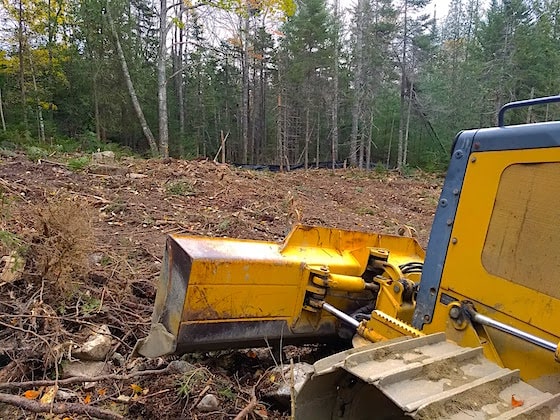Buying A Building Lot Tips

Buying a building lot - This is a cleared building lot. It's time to stake out the foundation so the foundation hole can be dug. Copyright 2018 Tim Carter
Buying a Building Lot Tips - Mistakes Can Be Costly
Three-Part Series - Part One of Three
The following is the first of a three-part series of what I think are some of the most important things you should look for when buying a building lot. Tim featured this first part of the series in his October 20, 2018 AsktheBuilder Newsletter.
Download the three parts of the series to use as a checklist when you decide to look at building lots.
Many of these are important whether the lot is vacant or has an existing home built upon it. Remember, the land is a real asset. Buildings are temporary. The land is the basis of long-term value.
What is the Best Size for a Lot?
Is the lot the right size for what you intend to build? Is there space for games/recreation? How about an outdoor pool or storage building? What about future expansion - will the lot support a room addition of reasonable size?
Be aware of the setback lines that are part of just about every lot. The part of the lot between a setback line and the actual property line is OFF LIMITS. This means you can't put any part of the structure in this zone. The setback lines can consume up to 40% of the actual lot in some cases! BEWARE of setback lines and discover where they are when buying a building lot.

This is a typical plot plan survey document. You can see the property lines, the pins at all the corners and bends as well as the distances along the property lines. Don't even look at a lot unless you have this in your hands and you can read all the print on the document. Copyright 2018 Tim Carter
Is Slope Important in a Building Lot?
Most people are fooled by level ground. What appears level may actually be a significant slope. If the ground is vacant, roughly stake out the house and driveway.
Hire a builder/remodeler with a transit level or rent one. Take elevations.
If your house has a basement and the lot falls more than 7 feet across the footprint of the house on the land, you WILL have problems! If it's a slab house, it should have no more than 18 inches of fall across the footprint.
What About Available Utilities Serving the Lot?
Are utilities available? Natural gas, electric (overhead or underground?), city/county water or well, public sewers, telephone, etc. Without utilities, you enter a time warp and go back 100 years or more.
Do you have to pay extra to tap into utilities OR has it been paid by the developer? Watch out, these tap-in fees can be astronomical if the developer tries to pass them on to you. Is the existing sewer REALLY public? You would be surprised how many miles of sanitary sewer are private!
Septic systems can be shared. My neighbor here in New Hampshire shares a leach field with four other homes. If just one home fails to maintain their septic tank by getting it pumped every three years, then the leach field can go bad. You may have to pay for part of a failed leach field that's not your fault.
Should I Consider Fire Protection?
Did you ever look at your homeowner's policy? A huge portion of your bill is based on fire coverage. Your lot location is rated: distance to closest hydrant, size of water main feeding hydrant, certification level of the local fire department, etc. The lower your rating in these areas, the higher your premium! You better get a quote from your insurance salesperson before signing a sales contract to buy the lot.
How Do I Determine City/County Services?
What kind, if any, of services, are provided to you or your road frontage? Is the road plowed? How is garbage collected? Do you pay extra for garbage removal? Are there special property assessments for past or planned improvements?
Is Compass Direction Important?
Are you building a passive solar house? Do you want to orient your deck a certain way? Do you want to bake under the hot afternoon sun on your deck? What about your swimming pool? Will your lot be shaded in the afternoon or early evening?

This is a great compass to have while looking at lots. As of 2018, it was priced at $9.99. CLICK THE PHOTO now to have it delivered to your home.
Are you on the north face of a hill in the Northern Hemisphere? If so, your ground surface may not see direct sunlight for two or more months! It will be frozen and damp all winter! Buy a $10 compass and keep it in your glove compartment.
What about Water Drainage?
Surface and subsoil drainage is one of the most important things you must consider. Vast amounts of water can move downslope through the soil.

Do your own DIY install of a Linear French Drain with Tim Carter's time-tested methods and materials! CLICK IMAGE TO ORDER NOW!
If you plan a basement, the walls may act like dams. Heavy rainfall can cause water to run overland towards your lot. Is your lot on a moderate rise where water will flow around it?
Is your new lot in a valley or a swale? Will this valley or swale have 5 or 8 feet of water flowing through it when the 100-year flood hits four years from now? This exact thing happened to a friend of mine in what appears to be a typical ordinary suburban neighborhood!
How Significant is the Soil When Buying a Building Lot?
Another key point is the soil. Don't overlook the significance of soil when buying a building lot. There are countless different types, all with different strength, drainage, fertility, etc. characteristics. Some clay soils shrink and swell in response to moisture content.
During droughts, the soil may fall beneath your foundation or slab and cause severe cracks! You can get free soil maps from your county agricultural extension office. It may take a few phone calls, but it will be well worth it.
CLICK HERE for Part Two of the Buying a Lot Series and 8 more tips for help in buying the land or lot you will call home!
Also featured in the February 11, 2016 AsktheBuilder Newsletter.
Column B154


2 Responses to Buying A Building Lot Tips